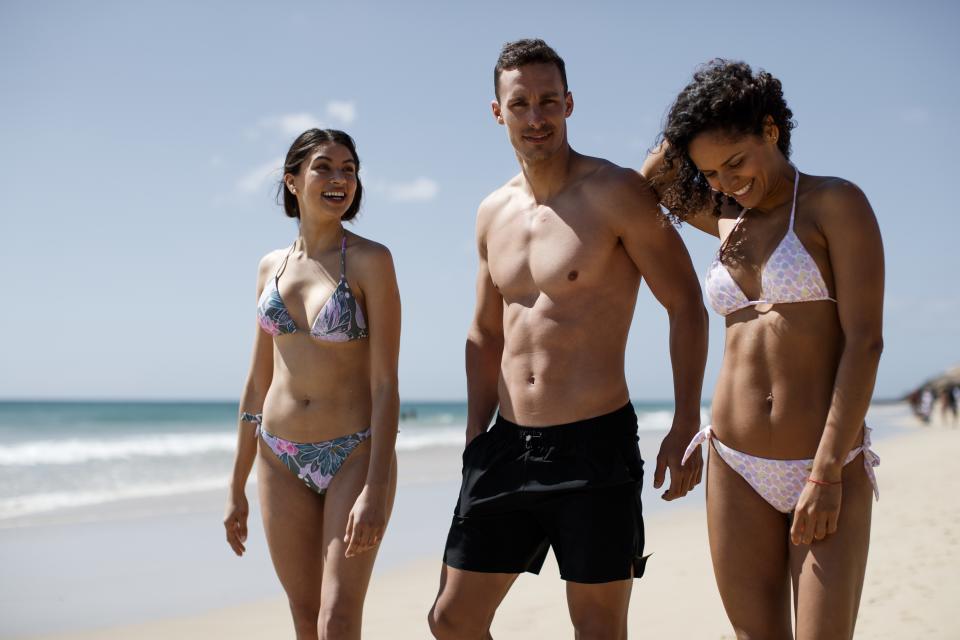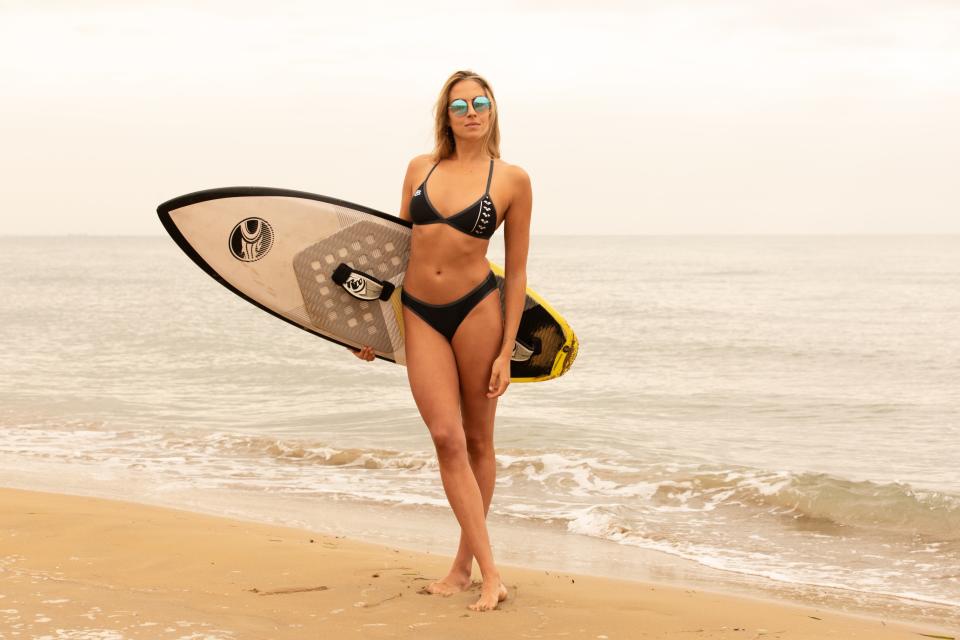CEO Talks: Arena’s Peter Graschi Predicts 34 Percent Revenue Growth in 2022

PARIS — Arena is betting on sustainable beachwear collections and increased investment in e-commerce, logistics and marketing to help it outperform competitors, as demand for swimwear bounces back in the aftermath of the coronavirus pandemic.
Peter Graschi, who took over a year ago as chairman and chief executive officer of the Italian swimwear firm, said the company is aiming for revenues of 130 million euros in 2022, up from 97 million euros last year, as it gears up to celebrate its 50th anniversary in 2023.
More from WWD
“Our goal is to grow two digits for 2022, for sure, but also 2023,” the Swiss executive told WWD in an interview, noting growth was fueled by a strong performance in the U.S. “We see, especially since the fourth quarter of last year, a high demand.”
As pools have reopened and travel returns to pre-pandemic levels, market research firm Technavio has forecast growth in the swimwear market will accelerate in the next few years. It expects the sector to post a compound annual growth rate of 6.4 percent between 2021 and 2026, fueled by demand for innovative products such as swimsuits that protect users from harmful UV rays.
Graschi thinks Arena can do better, helped by its leadership in racing and competition swimwear — reflected by its historical tag line: “The Champion’s Swimwear” — and the growing potential in recreational practices such as open water swimming.
“We are very confident to outperform the market. On one side, as a performance brand, we still have room to grow in these product families, especially in the U.S.,” he said.
“In the U.S., we had a very good 2021 and we started also very good in 2022. We also invested on more sports marketing for the U.S. market, so there we want to clearly grow,” he added.
Meanwhile, a collaboration with Fendi this year on a swimming cap and goggles is a sign of Arena’s intention to target a broader audience.
“Fashion and sport always went along together, and we can’t make a product which is also not looking good. The consumer will not accept it,” Graschi said. “Originally, the reason to found Arena by Horst Dassler in 1973 was to make swimwear for the champion. Today, we are way broader. We want to be a brand that supports and enables everyone who wants to be active in and by the water.”
Graschi’s appointment was widely interpreted as a sign that Swiss investment fund Capvis, which has owned the brand since 2014, is preparing Arena for sale, but he sidestepped a question about the owners’ intentions.
“Actually, when I came, my first job was to realign the strategy,” he said. “I am now really focused on the implementation of the strategy, which is also combined with a lot of investments.” While Graschi would not disclose the amount of capital expenditure this year, he said it was up 50 percent from 2021.

Gabriele Facciotti/Courtesy of Arena
Arena signed on as a technical sponsor of the recent International Swimming Federation World Championships held in Budapest, as well as the upcoming European Aquatics Championships in Rome in August. It has beefed up its e-commerce team and will implement SAP software this year to improve the flexibility and integration of its operations.
It has also invested in making its beachwear line more sustainable. Geared for leisure, it accounts for 8 to 10 percent of the company’s revenues. The 2023 collection contains 85 percent sustainable and recycled fabrics, and for the following season, the brand wants to increase this proportion to 100 percent.
“We really rethought the beachwear collection, how we want to do a beachwear collection, which is unique, because we won’t compete with the fashion brands. We have another history, and I think we have another kind of emotion. Fashion brands have a unique selling proposition, and sports brands have another one,” he said.
Meanwhile, its swimwear collection is made exclusively from recycled fabrics developed by its Italian suppliers Carvico and Eurojersey. Arena has also introduced what it bills as the very first FINA-approved race suit based on 70 percent recycled yarns. Swimwear represents 30 percent of sales, while racewear, equipment and sportswear make up the rest.
The company presented the collections at an event in Sardinia in May that also served as a teaser for its anniversary celebrations next year, which will be commemorated with a dedicated capsule collection.
Among the high-profile athletes in attendance were swimming legends like Steve Furniss and Matt Biondi, and current champions including Sarah Sjöström, Cate Campbell, Gregorio Paltrinieri and Nicolò Martinenghi. “It was very emotional,” Graschi said.

Courtesy of Arena
The pivot to more sustainable production dates back to fall 2021, when the brand launched an eco-friendly collection for children under its Arena Friends label.
“The awareness on the customer side has definitely changed in the last two years,” said Graschi, noting that it would not have been possible, for example, to propose carton-based packaging for goggles a few years ago.
“Then it’s also coming from the employees, especially from the young people. In all the interviews I had in the last year, I always got the question also from candidates, ‘What are you doing on sustainability?’ So I think it’s a demand coming from everywhere, from the shareholders up to the athletes that we are collaborating with, through our clients,” he said.
Arena’s offering includes swimsuits made from MaxLife Eco, a fabric incorporating more than 50 percent recycled polyester obtained from PET bottles and industrial waste, and produced adopting a circular economy approach that helps save energy, reduce CO2 emissions and minimize water usage.
Its MaxFit Eco fabric, which boasts superior elasticity, has the same look and technical qualities as the original fibers, including integrated UV protection. Meanwhile, its Bodylift body-shaping swimsuits use Eurojersey’s Sensitive Fit fabric, made with Reco Nylon, a nylon yarn made of pre-consumer waste.
“Around 10 percent of the recycled fabric is made of fishnets which have been pulled out of the Adriatic Sea with an organization called Healthy Seas, and the big share actually of the recycled fabrics is based on carpets,” Graschi explained. “Then a next step is how can we replace for example silicone, which we use on the caps or on the fins.”
Arena has hired Italy-based consultancy Nativa to help it draw up a road map for sustainability that goes beyond product. While its racewear is manufactured in Italy and Slovakia, the swimwear is mostly made in China and Vietnam. “Nearshore is a topic for us,” Graschi acknowledged.
As part of its mission, it has pledged to protect water, through initiatives like the “Swim 4 the Seas” challenge in partnership with marine conservation nonprofit Sea Shepherd and Strava, the social network for athletes, held to mark World Oceans Day in June. It’s also working with federations to provide access to swimming to as many people as possible.
“The special thing about swimwear is that swimming has in mind all this thought of pool and competition, but the new swimming is more about mental health and personal health,” Graschi said.
“If you start swimming and you go out, for example, to an open sea where you don’t see the ground, you have to overcome some barriers. But once you do it, once you do it regularly, it has a big impact on the mental health and on your self-confidence,” he concluded.
Sign up for WWD's Newsletter. For the latest news, follow us on Twitter, Facebook, and Instagram.


